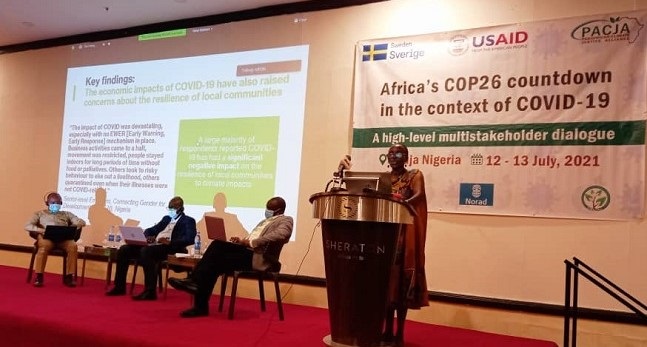Climate change should be treated as an emergency in the same way as the COVID-19 pandemic, according to a study led by Glasgow Caledonian University’s Centre for Climate Justice.

The study, which focused on the experiences of policymakers in climate-hit regions of Africa, recommends that climate emergencies should require governments to keep the public informed in the same way they have during the pandemic, with real-time data given as it has been for infection rates, death tolls and vaccination numbers.
The study, tagged “Impact of COVID-19 on the implementation of the Nationanally Determined Contributions (NDCs) in Africa”, also concluded that funding for developing countries must not be stopped or curtailed despite the economic fallout caused by the pandemic in wealthier nations.
The study was launched on Tuesday, July 13, 2021 in Abuja, Nigeria at the sideline of the weeklong “Road to COP26 Conference” holding at the instance of the Pan African Climate Justice Alliance (PACJA).
The research consortium, led by PACJA in partnership with the Glasgow Caledonia University’s Centre for Climate Justice and academic partners from eight African universities, undertook the four-month project to explore the impact of COVID-19 on climate-change efforts by compiling case studies of policymakers from Ethiopia, Gabon, Ghana, Ivory Coast, Kenya, Morocco and South Africa.
The other universities include: University of Nairobi (Kenya), Alex Ekwueme Federal University Ndufu-Alike (Nigeria), Abdelmalek Essaâdi University (Morocco), Kwame Nkrumah University of Science and Technology (Ghana), University of Addis Ababa (Ethiopia), Université Félix Houphouët-Boigny (Côte d’Ivoire), Universite Internationale de Libreville (Gabon), and University of the Western Cape (South Africa).
The study adopted a mixed-methods approach, which included a desk-based review of literature, an online qualitative survey and semi-structured interviews with representatives of 68 public, private and third-sector organisations based in all eight countries.
A number of interviewees observed that climate change, despite “ultimately being deadlier than the COVID-19 pandemic”, has failed to elicit the same level of urgency among governments and civil society. It was suggested that climate change should receive the same kind of attention from decision makers.
The study recommends treating climate change with the same severity as COVID-19, replicating the real-time reporting used during the pandemic for climate disasters, as well as adopting a precautionary approach to climate policy and programming.
Another common concern reported was a fear that resources towards the coronavirus pandemic response would detract from resources previously allocated to climate action, or that there would be a “downright reduction” of future financial commitments due to the resulting economic fallout. The study recommends industrialised nations must be encouraged to commit higher levels of financial support and technology transfer to the developing world.
More specifically, the study focused on the way the pandemic has affected the implementation of the Nationally Determined Contributions (NDCs) of the Paris Agreement, a global pact aimed at alleviating the impact of climate change while building resilience of countries and communities around the world. NDCs are national commitments to reducing greenhouse gas emissions and pursuing adaptation to climate impact.
It was found that the public health restrictions placed on gatherings and face-to-face contact for consultations were singled out as the most devastating impact of the pandemic for the NDC development process, which caused “significant delays” while workarounds were developed. Another key consequence of the disruptions caused by the pandemic, the study says, has been economic shock and the deterioration of livelihoods for many people in local communities.
The gathered data and recommendations will be used to inform policy makers on how best to shape post-COVID-19 reconstruction on the continent, as well as inform climate conversations ahead of COP26.
GCU’s Dr Sennan Mattar, who coordinated the work alongside Dr Michael Mikulewicz and partners from PACJA, said: “Although Africa accounts for a very small portion of global greenhouse gas emissions, African governments are committed to doing their share in stopping the climate crisis. However, many of their NDCs are conditional on receiving adequate financial support from industrialised nations. Combined with the existing considerable development challenges across the African continent, it is crucial that NDC and development funding is not stopped or curtailed despite the economic fallout caused by the pandemic in wealthier nations.”
